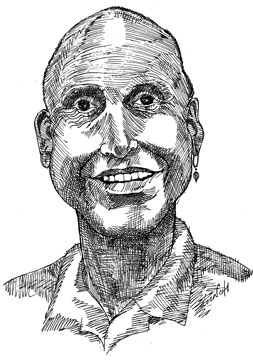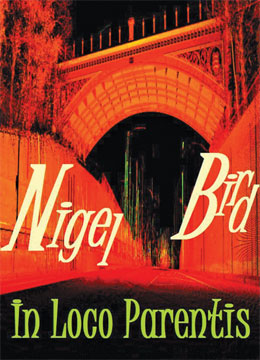Three dialogues on literature
By Pablo D' Stair
Number Three:
Nigel P. Bird and Pablo
DíStair
[Part 2]
NOTE: This dialogue is presented over the next four weeks in a style
of ďprogressive fragments.Ē The exact order of inquiry and response as
presented is not the order of inquiry and response as it happened
between the two dialogue partners. Therefore, ĎStatementsí and
ĎResponsesí from one week may not be directly addressed by both parties
until subsequent weeks. It is the hope of both parties that the spaces
between these responses allow readers the time and opportunity to more
fully and experientially engage with the propositions, for themselves,
rather than looking at the dialogue as a closed circuit.
 NIGEL BIRD: Iím sure that people write what theyíre comfortable with. NIGEL BIRD: Iím sure that people write what theyíre comfortable with.
The best writers move on from Ďpainting by numbersí and draw lines
that they werenít expecting.
Risk, to me, means that something will be lost if it doesnít come
off. You invest all your money in self-publishing 1 million copies of a
suicide story. Thatís risk. You put your reputation on the line by
writing about the ultimate taboo of the time. Thatís risk.
You write something that seems extreme because itís what you wanted
to write, thereís no risk there.
You decide that lots of people will buy a book if itís about
something controversial, thatís not risk either. Itís a plan.
Elements
Iíd like to think that the strongest elements of my writing are
driven by my sub-conscious (itís a concept Iím on board with and shoot
me down if you wish). It comes when characters I create do things I
wouldnít have expected from anyone.
And risk is also relative. Youíre taking a bigger risk at the present
time if you flag up some conservative, moral religious issue dating back
a couple of thousand years than if you pick holes in the idea. The most
radical thing Salman Rushdie could do now would be to align his
characters with the mutilation of women, the killing of innocents and
the trashing of modern technologies. If he were to do that to explore
and create thinking, heíd be hung out to dry and the death call would be
coming from the Western leaders this time.
Which makes sense as I write, but might be garbled nonsense.
PABLO DíSTAIR: Do you think, without the career side of things, the
marketplace side, there is no risk involved in art?
Connected, regarding the subconscious, I always feel that this is
where the artistic risk comes from. One follows these impulses,
harmlessly writing, something one should feel little choice about. But
once an individual has revealed something to themselves, once they see
words that are them, there is no going back on that, you know? It is the
subconscious (the largest part of us) that these words came from, so in
following the thrust of self-expression, there is the personal risk of
coming on yourself, unguarded, and, if one is honest, finding stranger
in what you see.
How do you feel about that?
 NB: In the end, thereís no risk if a writer doesnít stand to lose
anything Ė life, reputation, home. Revealing things about oneself is, in
the end, utterly harmless and riskless unless one has a weak core or is
announcing that there is something about one that will get a hammering Ė
youíre gay in an anti-gay society, communist in a staunchly capitalist
world, religious in an extreme communist stateÖlike yellow in a world
where yellow is banned. NB: In the end, thereís no risk if a writer doesnít stand to lose
anything Ė life, reputation, home. Revealing things about oneself is, in
the end, utterly harmless and riskless unless one has a weak core or is
announcing that there is something about one that will get a hammering Ė
youíre gay in an anti-gay society, communist in a staunchly capitalist
world, religious in an extreme communist stateÖlike yellow in a world
where yellow is banned.
I put out work. Thereís no risk, really. Letís say I do something
that upsets the entire writing community in which I feel involved.
Presence
The worst that happens is I disappear from an online presence. I miss
the people I like and respect (though if Iíve blown it with them, Iím
likely to have lost the plot as their loyalty and friendship are
strongly felt). I write in my own room like I do now. Maybe invent a new
name. I keep my home and my family and my freedom. Thatís OK. No risk
that I can imagine.
Having said that, I feel risk every time I speak or give an opinion.
Itís so easy to be knocked and hurt for having a position. I guess
thatís why I try to express myself in a way that hopefully takes out any
sting for others. I also happen to be one of those with a fairly weak
core Ė fragile and too easily damaged (in reality or in my mind only).
Mostly, I take more risks in terms of my own conscience and the
impact on the lives of others in my day job. Teaching Ė now thereís a
risky business.
PD: So, you donít find any risk in self-discovery? I donít say that
accusingly, but for myself I find an examination of my own conscience,
regardless of reaction to it, a risk. I think the riskiest thing one can
do is to regard themself fully.
So let me just ask, maybe better than keeping this in the rhetorical:
what do you feel you have discovered of yourself that you did not
consciously already consider of yourself before writing? Have you
uncovered nothing that, in private, in life, gave you pause, challenged
your very sense of who you are?
Art
And to end: I wholly agree with what I think you implicitly state:
writing, really, doesnít Affect anyone, a reader is not altered by art.
A person may be Influenced, may begin considering X or Y or Z, but it
is not the journey of the artist on the other side of the art that does
this. This is a reader-only experience and the craft, the style, the
choices of the writer are random.
But then, I donít think writers write for readers, I think there is a
pleasant company, a symbiosis, the one enjoying something from the
other, but writers write because they are writers, readers read because
they are readersóother than superficially, they do not touch.
Do you, truthfully, care what someone thinks of your work? Would you
not write it, as you seem to say, regardless of any one opinion and so
regardless of all opinion? What would change about how and/or what you
wrote if there were no readers?
NB: Self-discovery is generally a gradual process. My own, Iíd put
down to be more of a disappointment than anything. The things Iíve done
and justified to myself at the time of them happening do dig trenches of
guilt inside me, turn my stomach inside out, but I can hardly feign
surprise.
Iím not sure Iíve discovered anything about me through writing. Itís
possible Iíve confirmed a few suspicions is all.
Do I care if someone cares about my work? Completely. When itís not
liked, I take it personally.
There are things I need to clear up there, though.
Do I mind criticism? No, I have learned to value it as an ally.
Criticism of my work has been something I can only be grateful for. The
more highly-tuned the comments and the more specific they have been, the
more I have learned.
Do I mind being disliked by someone who hates anything like mine? No,
if itís not for them because of subject matter or genre, then thatís not
something Iíll mind.
Does it sting? Too right.
Would I change something I thought was perfectly formed to gain
applause? Unlikely, but I may just be fickle enough.
Series
I saw Doug Johnstone at the release of his new novel Hit And Run last
week. He said he had no intention of writing a series as it didnít
interest him. Should the book sell a million, however, heíd see what he
could do. That makes sense to me. Sell a bundle then write what you want
without worrying about where the next mortgage payment was coming from.
(Maybe I should just write porn!)
I write the way I do because thatís the way the stories come out.
There has to be a sense of audience, though, as thatís who Iím writing
for. The story is in my head, forming and evolving inside my brain.
If I make assumptions about the story based upon my prior knowledge
and forget to let the reader into the secrets they need to know, Iíll be
leaving them dangling and dissatisfied.
Would I write the same way if there were no readers? I wonder if Iíd
write at all if there were no readers.
I might write a diary if there was time, but thatís unlikely.
I might write poetry as a way to contain emotions in a shape that
allows me to express, release and look at them without them impacting so
directly upon me. I might also write poems in the way that some people
collect photograph albums, to map out a life so I can recall it when my
mind is disintegrating so that I can decide whether it was worth it or
not.
Stories? I donít think Iíd bother. Certainly not novels or novellas.
I just wouldnít see the point of all that work, all that emotional and
physical investment.
What that means is that I love writing because the writing will be
read. And if that contradicts anything I said earlier, I donít know what
to say.
Follies. Those building up for the sake of pleasing their makers. I
applaud the minds for their effort. Me, I guess Iíd be finding another
way to express myself so at least one or two might get to share them
with me. Piling up stones on beaches maybe. Transient art. Culinary
Sculpture. Anything that allowed me to complete it lazily and within a
short period of time.
Does a tree make a sound when thereís nothing there to hear it? In
essence, of course it does. Does a writer write when there are no
readers? Only if theyíre well out there on those lunatic fringes,
surfing them like waves.
|

